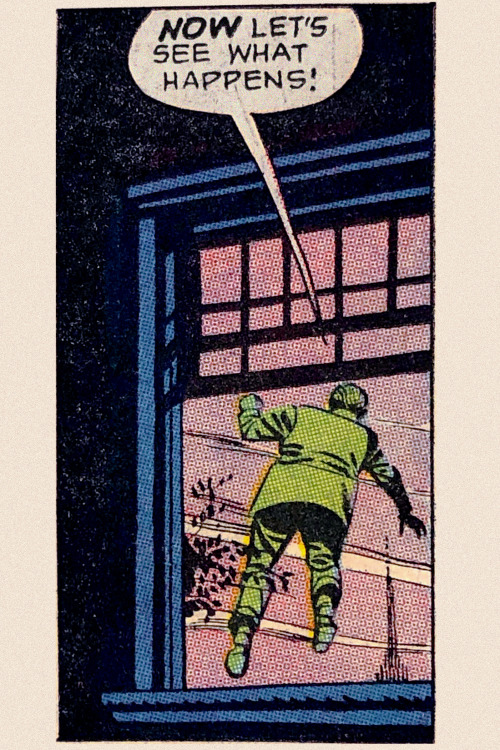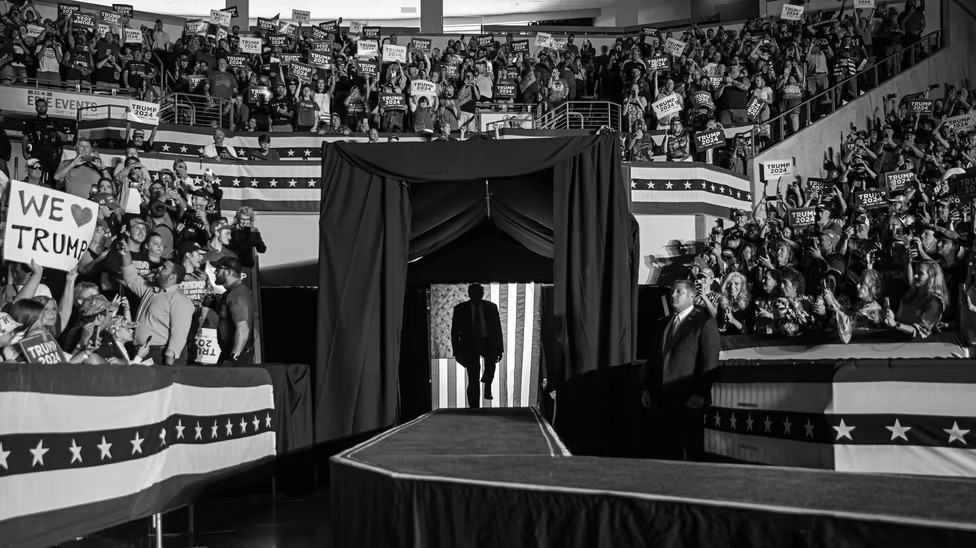
Anger over the increased cost of living, opposition to wars, the sense of being threatened, fear of chaos and insecurity, all contributed to the election of a (not so) new US president who will increase the cost of living, prepare for more war, accelerate the threats to life on this planet and sow plenty of chaos and insecurity.
The election of a man who can’t utter a paragraph without lying and spewing hate came as a shocking surprise to many. It shouldn’t have. In almost all elections in recent years, the opposition has won. Sometimes the left won, like in the UK, sometimes the right won, like in Argentina, sometimes both left and right won, like in France, but the ruling party or parties lost time and again. This trend reflects a general, worldwide discontent. The ruled become increasingly resentful of the rulers. With good reason. Inflation has raised the costs of living, wars multiply and are ever more destructive, climate disasters worsen, war, disasters and poverty make millions flee their homes, international tension is building, people are afraid of what’s coming…
In his “Totem and Taboo” Sigmund Freud writes that primitive kings were thought to possess powers to control the weather. Their subjects treated them as gods. But that also meant that, when there was a drought and the harvest was bad, the king had forsaken his duty. He was a bad king and was replaced or worse, tortured and killed. This magical thinking hasn’t yet disappeared. To the contrary, it is constantly nurtured and fanned by all the ideological institutions of the ruling class, including religions, political parties and mass media. So many subjects still believe that a new king, however brutal and obnoxious he may be, can “make America great again”.
Well, not all of them. The number of Americans who declined to vote increased by more then 8 million. Only slightly more than half of the vote age population choose to vote, and most of them, according to exit polls, voted for “the lesser evil” (more against than for a candidate). The rest presumably felt it would make no difference who won. Essentially, they are right. The choice between Trump and Harris was a choice between two pathways both leading to more misery and war.
Less than 30 % of the adult Americans voted for Trump but that was enough to win. That’s how democracy works. Trump obtained about the same number of votes as four years ago, when he lost. But this time the Democratic candidate did worse. Some say she lost because she was a woman and a person of color. Racism and sexism inevitably influenced some voters but it’s hard to think of a white male candidate who would have done better. Trump succeeded to exploit racial and misogynistic biases and still increase his share of non-white and female votes with empty promises of work and high wages for all. Often one heard Latino or female voters say in interviews: “I don’t like Trump but I think he will be good for the economy”.
Harris campaign theme was “joy”. She tried to contrast Trump’s grim view of reality with a more optimistic vision. Things are going well, unemployment is low, the stock markets are high, inflation is under control, crime went down. Too many did not recognize their lives in this pink-colored picture.
After “the economy” “migration” was at the top of voters concerns according to the polls. It is a real problem. The flow of unauthorized migrants, temporarily interrupted by the pandemic, rose sharply during the Biden administration. While this has been good for the profit-rate, the increase of the migrants and the lack of facilities to integrate them, caused all sorts of social problems. New York city for instance, had to scramble to cope with an influx of more than 200 000 undocumented newcomers, without any help from the federal government. Biden eventually adopted a sweeping asylum ban and other harsh measures to dampen the flow. A draconian package was agreed to by Democrats and Republicans but it was blocked by Trump, who obviously feared to lose a keystone of his campaign.
Trump’s theme was the opposite of Harris’ “joy”: things are not going well, great dangers are threatening you and your current leaders lead you towards them, only I can protect you. While the first part may be something that many feel, in a kind of abstract way, he needs to make it concrete.
What Trump needs are enemies who embody that danger. Enemies such as China, “the radical left” (including politicians like Nancy Pelosi !), “Marxists”, “anarchists”, “woke liberals”, transgender people, and many more but most of all the undocumented immigrants. They can best serve as scapegoats because they come from outside. They constitute an “invasion” against which we who are on the inside must unify to defend ourselves. “They poison the blood of our country,” said Trump who vilifies them in ways that would make European populists blush (“They’re eating the dogs”, etc.)
The fact that such a hate-driven discourse is appealing, not only in the US but everywhere, is frightening. But remember, only 28% of the adult Americans voted for Trump and many did so to vote against the government. The election of Trump does not mean as much as some people think. It is not through elections that the march towards immiseration will be stopped. That can only be done by class struggle. Working class people in the voting booths express themselves as individual consumers choosing between ideological pipe dreams, not as a class. It is in collective resistance against immiseration that the class can recognize itself.
Trump has promised so many glorious things to so many that he became like a Rorschach-test in which everyone can project something that they like. But what will change?
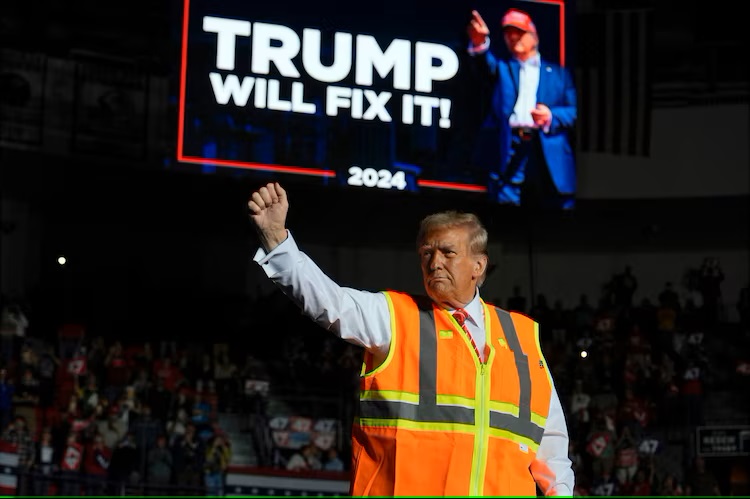
Trump has a busy schedule: deport all undocumented immigrants, levy hefty import taxes, cut taxes, stop wars, increase military spending, isolate China, abolish environmental regulations, boost fossil fuel production, give the police free rein, purge the public sector, persecute his opponents, to name only the outliers.
But a president is only successful in so far that he serves the capital of his country. If he does not do that or does not do it well, capital flows away. Just as water always seeks the lowest point, capital always seeks the highest return. The king does not control the weather, despite what Congresswoman Marjorie Green may think1. Not the president but the market rules and the market is not somebody, it is a mechanism that functions according its own logic, ultimately determined by the law of value, a machine that can only drive forward, with nobody at the steering wheel.
The mass deportation of undocumented immigrants is Trump’s main battle horse. Their number is estimated at 11 million but there could be several million more. Given the growing size of the shadow economy, it’s hard to be precise. You can find them everywhere, on construction sites, in the kitchens of restaurants, in meatpacking factories, in all the hard low-wage jobs. Sectors like agriculture, construction, hospitality and many others utterly depend on their labor. Deport them and the US economy nose-dives. Then there is the cost of such an operation, which, according to the New York Times, would be $88 billion a year. And this massive attack on a large part of the working class population would provoke intense opposition and social turmoil. Not good for profits. The capital market would punish such a policy. It’s safe to predict that it won’t happen. The purpose is not to expel all undocumented labor but to allow the government to control the labor flow with more efficiency.
The number of deportations will increase sharply but not to the extent that they would create a serious shortage of undocumented immigrant labor for capital. What they will do instead is instill fear. Fear of being lifted from your bed one night and put on a plane or locked up in a camp or prison. Fear of being torn away from your children and/or partner. Fear that forces you to swallow the lowest wages, the longest hours, the dirtiest tasks without grumbling. Fear and division among working people: a policy that aims for that will not displease capital.
But Trump will not change the causes of the migrant influx. In Latin America, Africa and Asia, the number of “surplus workers” who cannot be profitably employed grows every second. War, chaos and climate disasters are swelling their ranks. Those causes Trump will not fight, quite the contrary. So the migrants will keep coming. They are a symptom of a deadly sick world order. They will keep coming and Trump will keep raging against them. He needs them as a target for the “us” he needs behind him..
Trump has promised to end the wars. He even managed to win votes from Arab Americans with that promise. They are in for their trouble: the chances that Trump will pursue a less pro-Israel policy than his predecessor is zero. On that front, there was no choice in this election. The war will end when the dirty work in Gaza and Lebanon is done and the military superiority of the IDF, branch of the Pentagon, is sufficiently proven for all players in the oil-rich Middle East. Then Trump can reap the laurels as a peacemaker.
As for the war in Ukraine, Trump’s victory may well hasten a truce. He claimed he can get the job done even before he is inaugurated and while that is just another empty boast, things might speed up. The war expense is unpopular and that worked in Trump’s favor in the elections. Given Ukraine’s dependence on American weapons, Trump could force Zelensky to accept a truce. Zelensky will have to if he does not want to cede more ground to Putin. His country is broken and war weary, his army, after suffering a million casualties and growing desertion, is losing its willingness to fight for the fatherland. Same on the other side although the Russian population is obviously less affected. Right now, we see an escalation of the conflict with the arrival of North-Korean cannon-fodder in Russia, the US giving permission to Ukraine to shoot American missiles on targets in Russia and speed-delivering them anti-personnel landmines, and Russia attacking with a nuclear-capable supersonic missile to Ukraine and lowering the nuclear threshold. But it is to be expected that both parties, knowing that negotiations will start, want to put themselves in the best possible military position.
Would Trump then let America’s archenemy Russia win? For Trump, the archenemy is not Russia but China. That is the only other heavyweight in the geopolitical arena. The war in Ukraine drove Russia into China’s arms. The BRICS club is a very loose alliance for now but could be the beginning of the formation of an anti-American bloc. That goes directly against what has become America’s main geostrategic goal: to isolate China. If ending the war would help detach Russia from China, one can understand why Trump would be willing to accept a peace on conditions favorable enough to Putin to let him claim victory. His vice president J.D. Vance has already laid out the details. This would be a significant shift in the US’ geopolitical strategy which would be sharply criticized by the Democrats and all those in Washington who think Russia’s imperialist interests will always clash with those of the US. But they must be satisfied that America’s main goals in this war have been realized: the Russian military capacity is greatly diminished as a result of heavy casualties and destruction of military hardware, American gas has replaced Russian gas in the power plants of Europe and the capacity of the US to fight a war without putting boots on the ground has been resoundingly demonstrated. Besides, Democrats and Republicans all agree that the main imperialist rival is China, they only differ on tactics on how to confront the enemy.
The high import tariffs Trump wants to impose should be seen in that context. They are not just an economic policy, but a military one as well. Trump has threatened just about everyone with them but it is clear that he particularly targets China. He even talked about tariffs of 200 percent for some Chinese commodities and 60 percent for everything coming from China. That would whip up inflation, so again, the soup probably won’t be eaten as hot as he served it up. Trump has presented his protectionist plans as a means to compensate the state for his proposed tax cuts but given the risk of a trade war and the additional costs the measures would impose on companies and consumers it is hard to see how they would accomplish that goal. On the purely economic level, these tariffs make no sense. They will not generate more profit for US capital and risk to retract the world market. But they do make sense as an essential part of the US’s preparation for the larger war. The goal is to reduce the economic dependence on trade with China. Today the escalation of conflict between the two super powers is restrained by their strong mutual economic dependence. Trump aims to change that.
The future is frightening, so full throttle backwards to the time when America was “great.” Trump wants to bring it back: the time when taxes were low and wages went up, when we didn’t know what ‘transgender’ meant and didn’t worry about the climate. The climate crisis is a hoax, said Trump. He wants to increase the production of oil and gas, scrap climate talks and environmental regulations. Just when the scale of the existential threat that the climate crisis entails is becoming increasingly clear. What has been done on that front so far was already ridiculously little. The burning of fossil fuels keeps increasing, the many climate tops produce more back room oil and gas deals than meaningful measures. The insight was there, but competition and profit pressures made substantial progress impossible. Trump has translated capitalism’s inherent inability to solve the problem into a refusal to face it. Après nous, la deluge. But the deluge is already here.
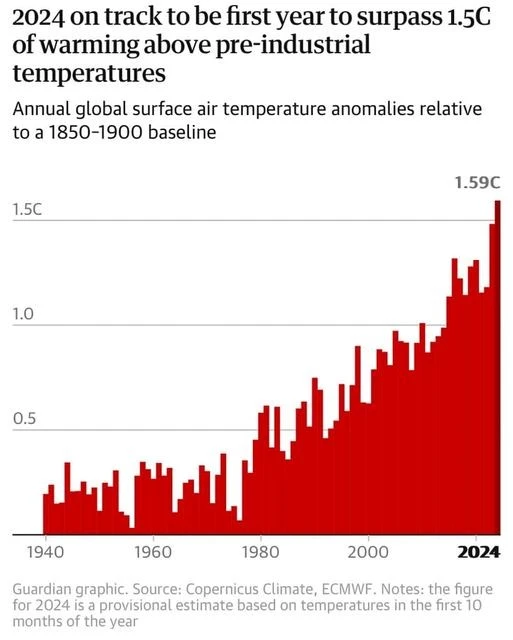
Of course capital welcomes the tax cuts promised by Trump. But the Committee for a Responsible Federal Budget estimates that his plan would add nearly eight thousand billion dollars to the national debt over the next ten years. As of Nov. 18, the national public debt stood at $35,963,976,342,723. That is 97 billion dollar more than on the first of the month. That is the pace nowadays and if Trump were to realize his plans, that debt, that massive loan of the future, would grow even faster. How high can it climb without causing a breakdown? How long before its fictitious essence is revealed?
The US is not the only country with a growing public debt. Indeed, the world’s total public debt is now three and a half times higher than the world’s annual production. When debt is due, it is basically financed with new debt. Meanwhile, interest rates are paid, and those interests must be high enough to attract capital. A country goes in debt to spend more, but that doesn’t mean it produces more value. When the money supply grows but value does not or not enough, that value is represented by more money, hence that money must devalue. Inflation, and the resulting rise of interest rates in order to remain able to attract capital, is the main restraint to public debt creation.
But this restraint is much looser for the US because its dollar is used in most international trade and serves as the world’s reserve currency. The trillions of dollars the US creates by issuing debt are still, for the most part, fictitious capital but they are real money, as good as other dollars. To the degree that it is fictitious, that it doesn’t contribute to the creation and realization of new value in the short or the long term, it is inflationary. But not necessarily in the US itself, if it can keep increasing its debt at low interest rates, which means if there is enough demand for it, enough capital worldwide that trades in dollars and keeps its savings in dollars. By investing in US debt, capital from other countries import its inflationary effect. And in the US not only the government but consumers and companies as well take on high debts, out of greed or necessity. Because they can. In the poor countries, they can’t. There, the state, corporations and consumers have low debt-rates.
If the quantity of money rises faster than the quantity of value, the total purchasing power is redistributed to the advantage of those who get the new money and the bigger they are, the cheaper they get it. Hence the gap between rich and poor keeps growing.
But the dominant position of the dollar can only be maintained if the US retains its military and economic dominance. Hence the paramount need for US capital, defended by all its political representatives whatever their stripes, is to demonstrate the US’ military superiority and to isolate and bring down China.
Still, the question remains: how high can the debt mountain rise before the Ponzi-scheme collapses? There are conflicting speculations about that but nobody can know this for sure. However no-one thinks that there is no limit, that the can can be endlessly kicked down the road. The lack of profit generated by total capital cannot be compensated by fictitious capital. The latter inflates the ‘value’ of existing capital and reduces the purchasing power of everyone else. So the rich get richer and the belief in value, in capital, is maintained.
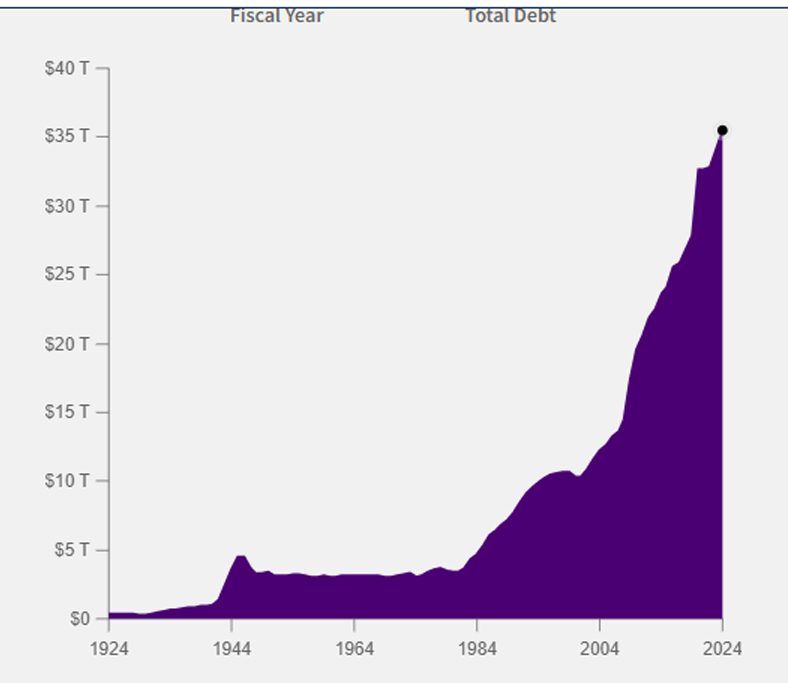
Raising the debt ceiling is a ritual in Congress, an occasion for political games but not something that anybody seriously wants to block. But Trump’s lower income taxes, higher spending on the military, and the cost and effect of the deportations and trade wars, would likely raise alarms in Washington about the bulging budget deficit. So Trump will cut spending. For that purpose there will be a brand new department, “the Department of Government Efficiency” which will be lead by Elon Musk and another deranged billionaire. Musk boasted that he can cut 30 percent – two trillion – of the budget. When he took over Twitter he reduced personnel from 8000 to 1500. In other words, he threatens mass lay-offs in the public sector. Attacks on social public spending are to be expected.
The tariffs and deportations will also worsen economic conditions and raise the costs of living. The working class will be under attack. Trump will use the deportations to divide the class, to pit workers against each other. He will continue to attack other minorities such as the transgenders, in order to foster division. The Democrats will be eager to absorb and canalize the resistance which his measures and rhetoric will stir up. But they have nothing else to offer but a different style of management with the same catastrophic outcome.
Some, like the Marxist-Humanist Initiative, think that “What is needed is a mass movement, against fascism and for liberal-democratic rights” (Meeting invitation 11/7/2024). We disagree. What is needed now, is autonomous proletarian struggle, for our own class interests, not a broad intraclassist movement for bourgeois democratic rights. We must reject the choices offered by democracy, otherwise we will never be more than a junior partner of this or that faction of the exploiting class, foot soldiers in its elections and wars. Only autonomous class struggle provides hope that the dead march capitalism is dragging the world on can be stopped.
Sanderr
11/20/2024
1She accused the Biden government of causing a hurricane to punish Republican states and tweeted: “Yes they can control the weather. It is ridiculous for anyone to lie and say it can’t be done.” (Oct 24)
